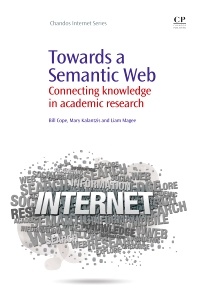Towards A Semantic Web Connecting Knowledge in Academic Research
Auteurs : Cope Bill, Kalantzis Mary, Magee Liam

List of figures and tables Figures
Authors
Chapter 1: Changing knowledge systems in the era of the social web
From print to digital text
Distributed knowledge systems: the changing role of the university
About this book
Chapter 2: Frameworks for knowledge representation
Putting things in order
Introducing the semantic web
Towards a framing of semantics
Chapter 3: The meaning of meaning: alternative disciplinary perspectives
Linguistic semantics
Cognitive semantics
Social semantics
Computational semantics
Chapter 4: What does the digital do to knowledge making?
The work of knowledge representation in the age of its digital reproducibility
The old and the new in the representation of meaning in the era of its digital reproduction
The hyperbole of the virtual
The hype in hypertext
The mechanics of rendering
A new navigational order
Multimodality
The ubiquity of recording and documentation
A shift in the balance of representational agency
A new dynamics of difference
Conclusions
Chapter 5: Books and journal articles: the textual practices of academic knowledge
The role of knowledge representation in knowledge design
The scholarly monograph
The academic journal
Future knowledge systems
Conclusions
Chapter 6: Textual representations and knowledge support-systems in research intensive networks
Introduction
Towards an ontology of knowledge
The theory of hierarchically complex systems
Research knowledge and the dynamics of hierarchically complex systems
Implications for managing research enterprises in a knowledge society
Public knowledge and the notion of a public knowledge space
Public knowledge and contextual information management practices
Public knowledge and the role of knowledge brokering
Conclusions
Appendix: a preliminary ontology for research knowledge support;
Chapter 7: An historical introduction to formal knowledge systems
Pre-modernity: logical lineages
Early modernity: the mechanisation of thought
Crises in modernity: the order of logic and the chaos of history
Chapter 8: Contemporary dilemmas: tables versus webs
Ordering the world by relations
Early threads of the semantic web
Shifting trends or status quo?
Systems of knowledge: modern and postmodern
Knowledge systems in social context
Chapter 9: Upper-level ontologies
A survey of upper-level ontologies
A dialogical account of ontology engineering
Conclusions: assessing commensurability
Appendix: upper-level ontologies— supplementary data
Chapter 10: Describing knowledge domains: a case study of biological ontologies
Biological ontologies
Biological cultures, ontological cultures
Ontological objects
Towards compromise: ontologies in practice
Chapter 11: On commensurability
A world of ‘material intangibles’: social structures, conceptual schemes and cultural perspectives
De-structuring critiques: struggling with systems, structures and schemes
Interlude: constructions of science
Elastic structures: linking the linguistic, the cognitive and the social
Towards a framework…
Chapter 12: A framework for commensurability
What to measure—describing ‘ontological cultures’
Presenting a framework for commensurability
Applying the framework
Chapter 13: Creating an interlanguage of the social web
The discursive practice of markup
Structural markup
Metamarkup: developing markup frameworks
Developing an interlanguage mechanism
Schema alignment for semantic publishing: the example of Common Ground Markup Language
What tagging schemas do
Interlanguage
Chapter 14: Interoperability and the exchange of humanly usable digital content
Introduction
The transformation of digital content
The XML-based interlanguage approach: two examples
The ontology-based interlanguage approach: OntoMerge
Evaluating approaches to interoperability
Addressing the translation problem: emergent possibilities
Conclusions
Acknowledgements
Chapter 15: Framing a new agenda for semantic publishing
The academic language game
Disciplinarity, or the reason why strategically unnatural language is sometimes powerfully perceptive
Experiential knowledge processes
Conceptual knowledge processes
Analytical knowledge processes
Applied knowledge processes
Towards a new agenda for semantic publishing
Index
Dr Mary Kalantzis is Dean of the College of Education at the University of Illinois, Urbana-Champaign and, with Bill Cope, co-author of The Powers of Literacy, University of Pittsburgh Press, 1993; Multiliteracies: Literacy Learning and the Design of Social Futures, Routledge, 2000; New Learning: Elements of a Science of Education, Cambridge University Press, 2008; and Ubiquitous Learning, University of Illinois Press, 2009.
Dr Liam Magee is a research project leader at RMIT University in Melbourne, Australia, working on the theory and practice of the semantic web.
- Provides an introduction to the ‘semantic web’ and semantic publishing for readers outside the field of computer science
- Discusses the relevance of the ‘semantic web’ and semantic publishing more broadly, and its application to academic research
- Examines the changing ecologies of knowledge production
Date de parution : 01-2011
Ouvrage de 544 p.
15.5x23.2 cm
